Ferrari V10 engine
Ferrari manufactured a series of 3.0-litre, naturally-aspirated, V10 racing engines, exclusively for their Formula One race cars; between 1996 and 2005.[4][5] They chose a V10 engine configuration, because it offered the best compromise between power and fuel efficiency; the V12 was powerful but thirsty while the V8 was weaker but economical.[6] They switched to 2.4-litre naturally-aspirated V8 engine configuration for 2006.[7][8] Over its decade-long evolution, power levels varied; from 715 hp (533 kW; 725 PS) @ 15,500 rpm in 1996,[9] to over 900 horsepower,[10] around 935 hp (697 kW; 948 PS) @ 19,000 rpm, toward the end of the 2005 season.[11][12][5] The Tipo 05 series of engines, produced between 2001 and 2005, was officially stated to produce between 825 hp (615 kW; 836 PS) @ 17,800 rpm, and 865 hp (645 kW; 877 PS) @ 18,300 rpm.[13][14][15][16][17] In qualifying mode, however, these engine were reputed to develop up to, or at times over, 900 horsepower (670 kW) at 19,000 rpm.[10][18]
| Ferrari V10 engine | |
|---|---|
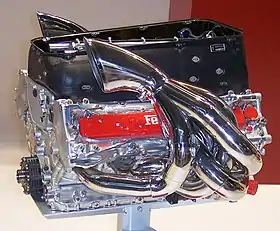 | |
| Overview | |
| Manufacturer | Ferrari |
| Designer | Paolo Martinelli (department head) Osamu Goto (chief designer) (1996–1997) Gilles Simon (chief designer) (1998–2005) |
| Production | 1996–2005 |
| Layout | |
| Configuration | 75°-90° V10 |
| Displacement | 3.0 L (183.1 cu in) |
| Cylinder bore | 96–98 mm (3.8–3.9 in) |
| Piston stroke | 39.75–41.4 mm (1.6–1.6 in) |
| Valvetrain | 40-valve, DOHC, four-valves per cylinder |
| Compression ratio | 13.0:1/17.0:1 |
| Combustion | |
| Fuel system | Electronic fuel injection |
| Fuel type | Gasoline |
| Oil system | Dry sump |
| Cooling system | Water-cooled |
| Output | |
| Power output | 715–940 hp (533–701 kW; 725–953 PS)[1][2] |
| Torque output | approx. 241.5–305 lb⋅ft (327–414 N⋅m)[3] |
| Dimensions | |
| Dry weight | 90–120 kg (198.4–264.6 lb) |
| Chronology | |
| Predecessor | Tipo 044/1 |
| Successor | Tipo 056 |
First generation: Tipo 04x engine (1996–2000)
Tipo 046/046/2 (1996–1997)
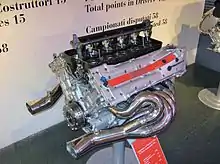
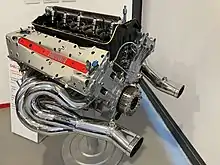
This Tipo 046 engine is notable for being the first to use the then more conventional V10 engine format, because a V10 engine offered the best compromise between power and fuel efficiency; the V12 was powerful but thirsty while the V8 was weaker but economical. The engine was also called the 310. It was engineered by former Honda technician Osamu Goto. The engine is a 75-degree V10; and produces 715 hp @ 15,550 rpm.[19][7] The engine itself weighs 120 kg (265 lb).
Tipo 047/B/C (1998)
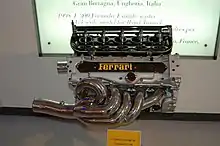
The 3-litre Ferrari Tipo 047 V10 engine and designed around a narrower track as mandated by the FIA in a series of regulation changes for that season.[20] The engine itself is a 80-degree V10; which makes 805 hp (600 kW) @ 17,300 rpm.[21]
Tipo 048/B/C (1999)
The Tipo 048/B/C engine is an 80-degree, 3.0-litre V10 engine, manufactured by Ferrari. The engine itself was designed by Giles Simon; who lead the engine design and operations. It produces 790 BHP (552 KW) @ 16,300 rpm, and won Ferrari their first World Constructors' championship in 20 years.[22]
Tipo 049 (2000)
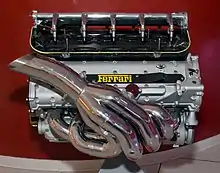
Giles Simon lead the engine design procedure and operations of the Tipo 049. The engine was newly designed, with a wider V-angle (90 degrees vs. 75 degrees in the 048 engine); this new wider angle improved and lowered the centre of gravity of the car that it powered. The engine produced between 805 and 815 hp @ 17,300 RPM.[23][24]
Second generation: Tipo 05x engine (2001–2005)
Tipo 050 engine (2001)
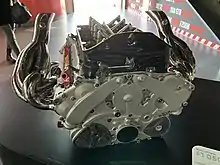
The Ferrari Tipo 050 engine was designed by Gilles Simon. It is a 90-degree V10; which produces 825 horsepower (615 kW) @ 17,300 rpm in race mode.[13] However, the engine can be tuned to produce up to 900 horsepower in qualifying trim. The whole engine unit weighs 94 kg (207 lb.).[25]
Tipo 051 engine (2002)
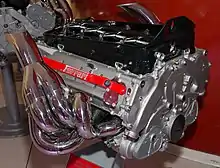
Ferrari Tipo 051 is the name of a racing engine from the Italian manufacturer Ferrari, which the team used in Formula 1 in the 2002 season. The V10 engine was developed under engine chief Paolo Martinelli.
The Type 051 was a new development but based on the architecture of its predecessor, the Tipo 050. All the main components have been revised. The engine block was made using a refined micro-casting technology. The cylinder heads were downsized and the crankcase modified so that the crankshaft was lowered, giving the vehicle an exceptionally low center of gravity. Associated components have been redesigned to reduce rotating masses and friction.
Ferrari also developed a new transmission for the new engine. The new case is significantly smaller, stiffer, and made from a lightweight titanium alloy, making it around 15% lighter than its predecessor. Along with the lighter internals and new clutchless direct shift technology, this resulted in smoother and faster shifting. Prototypes of this transmission were already on the test bench in September 2001. In this way, the team was able to ensure that, despite all the innovations, it was reliable right from the start.
The engine management came as before from Magneti Marelli, Shell supplied the fuel.
The Tipo 051 was used by Ferrari in the 2002 season on the F2002. Sauber used this engine (development status mid-September 2002) in the Sauber C22 in the 2003 season. However, Sauber used the name PETRONAS 03A for the engine.
Ferrari officially specified 835 hp at 17,800 rpm. In qualifying mode, however, the engine developed up to 900 hp at 19,000 rpm. In order to ensure durability, the performance in the race was reduced. There it delivered up to 865 hp at 18,600 rpm. With this power, the Type 051 was considered one of the most powerful engines in the field and was only surpassed by the P81 used by BMW Williams. This made up to 940 hp, but was less reliable than the Type 051.
In the course of the season, there were two further expansion stages, type 051B/C.
Specifications
Weight: 95 kg
Engine Configuration: 90° V10
Bore: 96mm
Stroke: 41.4mm
Valves: 4 per cylinder
Displacement: 3.0 liters
No. of revolutions: Max. 17,800 rpm
Power: ~ 614 kW (835 hp)
Power/liter: 279 hp/L
Exhaust: Two outlet pipes
Installation position: Mid-engine, rear, longitudinal
Giles Simon and Paolo Martinelli led the engine's design and operations. The 3.0-litre Tipo 051 V10 engine produced 835 horsepower (623 kW) @ 17,800 rpm in race trim.[5] In qualifying mode, however, the engine developed up to 900 horsepower (670 kW) at 19,000 rpm.[10][18] The engine had a very low centre of gravity, but to ensure durability and reliability, the engine performance was reduced during the race. Thus, the Tipo 051 was capable of producing 865 horsepower (645 kW), and revving to a maximum of 18,600 rpm, all while having excellent handling. The new 051 engine was not the strongest engine of 2002, only being beaten out by the BMW P81 engine used by the Williams team (which produced 940 horsepower (700 kW)); but it was lighter, more compact, very fuel-efficient, and very driveable. An innovative and very small clutchless gearbox allowing ultra-quick changes had been designed, and because the unit was so small, the rear end aerodynamics were extremely tightly packaged.[26] Bridgestone developed special tyres, suited specifically for the car.[27][28][29]
Tipo 052 engine (2003)
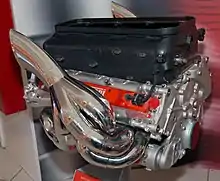
Ferrari Type 052 is the name of a racing engine from the Italian manufacturer Ferrari, which the team used in Formula 1 in the 2003 season. The V10 engine was developed under engine chief Paolo Martinelli.
The Tipo 052 was used by Ferrari in the 2003 season. Ferrari contested the first four races of the season with the previous year's car, the F2002. The Type 052 was not used until the fifth race with the debut of the F2003-GA. This was because the F2003-GA's chassis was designed around the engine.
The Tipo 052 was a completely new development. Ferrari essentially pursued two goals when developing the Tipo 052. On the one hand, the performance and drivability of the engine should be improved without impairing the reliability of the predecessor. On the other hand, the engine should be even better adapted to the design of the chassis in order to achieve better weight distribution. The team also hoped that the improved integration would result in weight savings of 4-5 percent and improved aerodynamics at the rear of the car. In addition to better integration, new materials also resulted in weight savings.
Engine management was by Magneti Marelli.
The specification used at the beginning of the season delivered around 200 revolutions per minute more than the predecessor Type 051.
During the season there were the usual expansion stages. Even though Ferrari officially stated an output of 845 hp at 18,300 rpm, experts suspected an output of 900 hp at up to 19,000 rpm.[30][31]
Paolo Martinelli, assisted by Giles Simon, lead the engine design and operations.[32] The Tipo 052 engine was a developed versions of the previous model.[33][34][35] The 3.0 L V10 engine produced 845 horsepower (630 kW) @ 18,300 rpm[36]
Weight: 85 kg
Engine Configuration: 92° V10
Valves: 4 per cylinder
Displacement: 3.0 liters
No. of revolutions: 18,300 rpm
Power/liter: 282 hp/L
Exhaust: Two outlet pipes
Power: (900 hp)
Installation position: Mid-engine, rear, longitudinal
Tipo 053 engine (2004)
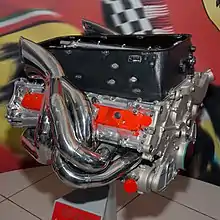
Ferrari Tipo 053 is the name of a racing engine from the Italian manufacturer Ferrari, which the team used in Formula 1 in the 2004 season. The V10 engine was developed under engine chief Paolo Martinelli.
Type 053 is a completely new development. The engine rules introduced for the 2004 season required that each engine last an entire race weekend. An illegal engine change would have resulted in a grid penalty of 10 places. That is why Ferrari focused on durability and reliability when developing the 053. To achieve this goal, all moving parts have been redesigned. The weight increased only slightly compared to the predecessor Type 052, which is partly due to the use of new alloys. The engine management came from Magneti Marelli.[37]
For the fourth year running, Technical Director and Paolo Martinelli, assisted by Giles Simon, lead the engine design and operations. The engine powered the highly successful Ferrari F2004, that was driven by Michael Schumacher and Rubens Barrichello, and gave Schumacher his fifth and final World Championship with Ferrari at the Belgian Grand Prix, and his seventh Formula One World Championship overall. The engine was now designed in accordance with the FIA's new technical regulations for the season, and had to last a full race weekend.[38][39][40] The engine now produced 865 horsepower (645 kW) @ 18,300 rpm in race trim,[16] and around 920 horsepower (690 kW) @ 19,000 rpm in qualifying mode.[41] The engine also now weighed only 92 kg (203 lbs.).[24]
The Type 053 was only used in the 2004 season and only by Ferrari on the F2004 and Sauber on the Sauber C23. However, Sauber used the name PETRONAS 04A for the engine.[42]
For the San Marino Grand Prix, there was the first stage of development that delivered 920 hp.
Specifications
Weight: 95 kg
Length: 597mm
Width: 530mm
Height: 353mm
Engine Configuration: 90° V10
Valves: 4 per cylinder
Offset angle: 144°
Bore: 98mm
Stroke: 39.75mm
Displacement: 3.0 liters
No. of revolutions: Max. 19,000 rpm
Power/liter: 307 hp/L
Exhaust: Two outlet pipes
Power: (920 hp)
Installation position: Mid-engine, rear, longitudinal
Tipo 055 engine (2005)
Ferrari Type 055 is the name of a racing engine from the Italian manufacturer Ferrari, which the team used in Formula 1 in the 2005 season. The V10 engine was developed under engine chief Paolo Martinelli.[43]
The Tipo 055 is a further development of the predecessor Type 053. The engine rules introduced for the 2004 season were tightened again for the 2005 season. From now on, an engine had to last two entire race weekends. An illegal engine change would have resulted in a grid penalty of 10 places. Therefore, as in the previous year, Ferrari's focus in the development of the 055 was on durability and reliability. To achieve this goal, many parts were newly developed, some could be taken over from the predecessor. Although the engine was stable, the weight increased only marginally.[44]
The engine management came as before from Magneti Marelli. Shell supplied new fuel and lubricants that should have a positive impact on reliability.
Throughout the season there were the usual stages of expansion.
The Tipo 055 was Ferrari's last 10-cylinder engine. From the 2006 season, Formula 1 relied on V8 engines with a displacement of 2.4 liters.
For the fifth and final year running, Technical Director Paolo Martinelli, assisted by Giles Simon, led the engine design and operations. The car was driven by Michael Schumacher and Rubens Barrichello. This was also Ferrari's last V10 engine. The 90°, naturally-aspirated, 3.0 L (183 cu in) Tipo 055 engine made 865 hp @ 18,300 rpm, in race trim,[45] and about 940 hp @ 19,000 rpm in qualifying mode.[2] The engine only weighed around 90 kg (198 lb).
The Type 055 was only used in the 2005 season and only by Ferrari on the F2005 and Sauber on the Sauber C24. However, Sauber used the name PETRONAS 05A for the engine.[46]
Specifications
Weight: 90 kg[47]
Engine Configuration: 90° V10
Valves: 4 per cylinder
Displacement: 2998.3 cc
No. of revolutions: Max. 19,000 rpm
Exhaust: Two outlet pipes
Power Output: (940 hp)
Installation position: Mid-engine, rear, longitudinal
Formula One engine specifications
Naturally-aspirated V10 engines
| Engine name | Bank angle (°) | Configuration | Displacement (L) | Power Output | Year | Aspiration |
|---|---|---|---|---|---|---|
| Tipo 046 | 75 | V10 | 3.0 | 715-725 hp @ 15,550 rpm[48] | 1996 | N/A |
| Tipo 046/2 | 75 | 730-760 hp @ 16,050 rpm[49][50] | 1997 | N/A | ||
| Tipo 047/B/C | 80 | 790-805 hp @ 16,300 rpm | 1998 | N/A | ||
| Tipo 048/B/C | 80 | 805 hp @ 17,300 rpm | 1999 | N/A | ||
| Tipo 049 | 90 | 805-815 hp @ 17,300 rpm | 2000 | N/A | ||
| Tipo 050 | 90 | 825-840 hp @ 17,300 rpm | 2001 | N/A | ||
| Tipo 051 | 90 | 835 hp @ 17,800 rpm (race) 900 hp @ 19,000 rpm (qualifying) |
2002 | N/A | ||
| Tipo 052 | 90 | 845-860 hp @ 18,300 rpm (race) 900 hp @ 19,000 rpm (qualifying) |
2003 | N/A | ||
| Tipo 053 | 90 | 865 hp @ 18,300 rpm (race) 920 hp @ 19,000 rpm (qualifying) |
2004 | N/A | ||
| Tipo 054/055 | 90 | 865 hp @ 18,300 rpm (race) 940 hp @ 19,000 rpm (qualifying) |
2005 | N/A |
Applications
- Ferrari F310 and Ferrari F310B: Tipo 046 and Tipo 046/2
- Ferrari F300: Tipo 047/B/C
- Ferrari F399: Tipo 048/B/C
- Ferrari F1-2000: Tipo 049
- Ferrari F2001: Tipo 050
- Ferrari F2002: Tipo 051/B/C
- Ferrari F2003-GA: Tipo 052
- Ferrari F2004: Tipo 053
- Ferrari F2005: Tipo 054[51] and Tipo 055[17]
Formula One World Championship results
- 6 World Constructors' Championships.
- 5 World Drivers' Championships.
- 77 race wins.
- 62 pole positions.
- 185 podium finishes (including Sauber Grand Prix results).
References
- "Engine Ferrari • STATS F1". www.statsf1.com. Retrieved 2021-10-07.
- "Ferrari F1 Cars Sound Magnificent at Fiorano". 27 July 2012.
- "Spicer Horsepower and Torque Calculator".
- "Ferrari's First V10 Single Seater: The F310".
- "Get to Know Ferrari's Most Spectacular Formula 1 Engines". 29 July 2021.
- Codling, Stuart (25 May 2021). Ferrari Formula 1 Car by Car: Every Race Car Since 1950. ISBN 9780760367773.
- "Ferrari F310". www.f1technical.net. Retrieved 4 February 2020.
- "Ferrari F1, #7, 1996-1999: The Early Schumacher Years". Ferraris Online. 2020-01-12. Retrieved 2021-10-07.
- "Ferrari F310 (1996) - Ferrari.com". www.ferrari.com.
- "For Sale: A Ferrari Tipo 051 V10 Formula 1 Engine - 900 BHP". 21 November 2019.
- Archived at Ghostarchive and the Wayback Machine: "Ferrari F2005 F1 V10 ex Barrichello EPIC Sound on Track!". YouTube.
- "Ferrari's Most Alluring F1 Engines". June 2017. Archived from the original on 2021-05-15. Retrieved 2021-10-10.
- "Ferrari F2001 (2001) - Ferrari.com". www.ferrari.com.
- "Ferrari F2002 (2002) - Ferrari.com". www.ferrari.com.
- "Ferrari F2003 - GA (2003) - Ferrari.com". www.ferrari.com.
- "Ferrari F2004 (2004) - Ferrari.com". www.ferrari.com.
- "Ferrari F2005 (2005) - Ferrari.com". www.ferrari.com.
- "Ferrari's Most Alluring F1 Engines". June 2017. Archived from the original on 2021-05-14. Retrieved 2021-10-17.
- "Ferrari F310 (1996)". www.ferrari.com. Retrieved 17 November 2020.
- Bissett, Mark (25 January 2015). "Irvine's Ferrari F300: Monaco 1998". primotipo.com. Retrieved 24 April 2016.
- "Ferrari F300 (1998) - Ferrari.com". www.ferrari.com. Retrieved 15 November 2020.
- "Ferrari F399 (1999) - Ferrari.com". www.ferrari.com. Retrieved 15 November 2020.
- "Ferrari F1-2000 (2000)". www.ferrari.com. Retrieved 17 November 2020.
- "Engine Ferrari • STATS F1".
- "Ferrari F2001 - Mighty Machine for the New Century". 2 December 2016.
- "Motor1.com Legends: Ferrari F2002". Motor1.com. Retrieved 28 January 2020.
- "There Are Two Ferrari V-10 Formula 1 Engines for Sale Right Now". 25 November 2019.
- "Ferrari F2002 Tipo 051/B/C V-10 Engine, 2002 | Online Only: Formula 1 Memorabilia | RM Online Only".
- Markovich, Tony (23 November 2019). "The V10 from Schumacher's and Barrichello's Ferrari F2002 is for sale". www.autoblog.com. Retrieved 30 January 2020.
- "Ferrari 052". 12 October 2013.
- "Ferrari F2003-GA: For sale the engine is the V10 from 845 CV Schumacher". 15 January 2020. Archived from the original on 19 January 2022. Retrieved 19 January 2022.
- Günther Raupp (2008). Ferrari. 25 years of calendar images. Ediz. multilingue. teNeues. pp. 64–. ISBN 978-3-8327-9283-1. Retrieved 16 August 2013.
- "For Sale: A Ferrari F2003-GA Formula 1 V10 Engine - 845 hp at 18,300 RPM". 13 January 2020.
- "Ferrari F2003-GA Engine | the European Sale featuring the Petitjean Collection | RM Online Only".
- "Ferrari F1 Engine Signed by Michael Schumacher Looks Like a Work of Art". 3 February 2020.
- "Ferrari F2003 - GA (2003) - Ferrari.com". www.ferrari.com. Retrieved 15 November 2020.
- "Martinelli: Neuer Motor hat "genug Leistung"".
- "Ferrari F2004". www.f1technical.net. Retrieved 29 January 2020.
- "2004 Ferrari F2004 Specifications". Ultimatecarpage.com.
- "Key elements of Ferrari 053 engine".
- "Ferrari F2004 - F1technical.net".
- "Sauber C23 - F1technical.net".
- https://www.motorsport.com/f1/news/the-ferrari-055-engine/177956/?nrt=54
- "Hintergrund - der F2005: Der beste Ferrari aller Zeiten - Formel 1". 25 February 2005.
- "Ferrari F2005 (2005)". www.ferrari.com. Retrieved 17 November 2020.
- "Sauber C24 mit ausgefeilter Aerodynamik".
- "Repubblica.it / Formula1 2005".
- "Ferrari F1 | HowStuffWorks". 16 May 2007.
- "Ferrari F310 B (1997) - Ferrari.com". www.ferrari.com.
- "Engine Ferrari • STATS F1".
- "Formula 1 engine suppliers - History". www.formula1-dictionary.net.